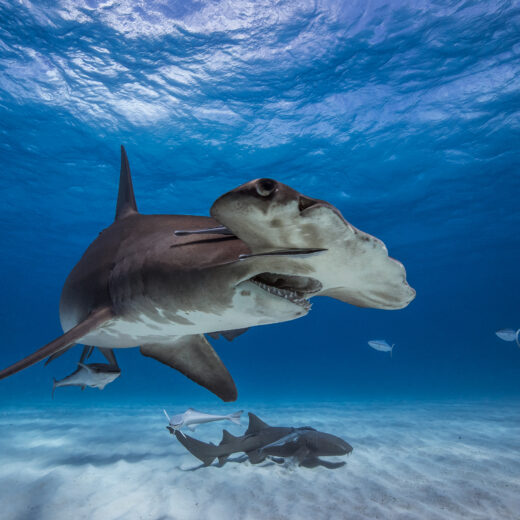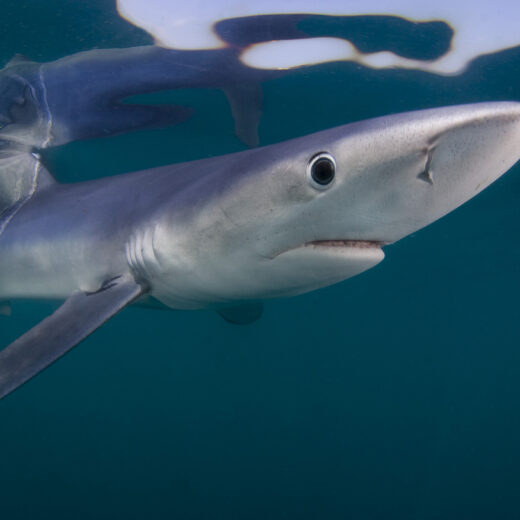
Amid repeated calls from the public, Hong Kong SAR’s largest restaurant group Maxim’s Caterers Limited (Maxim’s) announced Thursday it would stop serving shark fin beginning January, 2020. WildAid, which has been calling on the caterer to demonstrate its environmental leadership and uphold its own stated sustainability policy for more than two years, commends Maxim’s for protecting imperiled shark populations.
“As one of the most popular restaurant chains in Hong Kong SAR, Maxim’s stand against shark fin consumption is a major victory for sharks and our oceans,” said WildAid CEO Peter Knights. “We hope this serves as a leading example for other restaurants and hotels to take shark fin off their menus and join the rest of society in protecting our oceans and fisheries.”
A statement issued by Maxim’s Chinese Cuisine read: “As market and customer preferences have evolved in Hong Kong SAR, Maxim’s Chinese Cuisine will stop serving shark fin in all restaurants starting from 1 January 2020. Until that point, shark fin dishes will only be provided upon request and to fulfill advanced booking commitments. […] We are committed to balancing our ever-evolving customers’ needs and reducing the impact of our business on the environment, and through such balance we will continue to provide a diverse and quality catering service.”
Since early 2016, WildAid has been working in Hong Kong SAR – the world’s shark fin trade hub –to encourage Maxim’s to take the dish off its à la carte and set menus and to persuade consumers not to buy shark fin though public advocacy campaigns featuring influential personalities like Jay Chou and Bowie Wu.
Alex Hofford, Wildlife Campaigner for WildAid Hong Kong SAR, applauded Maxim’s for ridding its menus of shark fin but expressed concern that the delicacy will be offered “upon request” until 2020.
“Maxim’s commitment will bring much needed relief to the global problem of overfishing, especially for blue sharks, the type of shark being served in Maxim’s restaurants in Hong Kong SAR,” Hofford said. “However, we encourage Maxim’s to phase out all shark fin from its business operations as soon as possible, and certainly before January, 2020. We are concerned that Maxim’s has said that it will continue to offer shark fin “upon request” until 2020. This continued practice is harmful and unnecessary and should be discontinued immediately. To further protect the marine environment, we are also calling on Paramount Catering Group, Lei Garden Restaurant Group, Fulum Group Limited and all other big catering groups in Hong Kong SAR to act sustainably, ethically and responsibly by following Maxim’s example.”
Shark fin soup in Hong Kong SAR is often ordered from a set menu by a single person on behalf of a large group, usually to celebrate a special occasion such as a wedding banquet, birthday, family reunion or corporate event. Taking shark fin off the menu at more than 50 Maxim’s outlets across Hong Kong SAR is welcome progress after several missteps.
In 2017, Maxim’s announced it had become “the first Chinese restaurant chain to completely phase out shark fin dishes from our à la carte menus.” However, WildAid obtained documentary evidence of shark fin being offered for sale on secret à la carte shark fin menus in multiple Maxim’s restaurants across Hong Kong SAR, signifying a breach of the company’s advertised environmental commitment. Maxim’s new announcement follows the chain’s parent group, Jardine’s whose Mandarin Oriental Hotel Group banned shark fin in 2015.
Around 100 million sharks are unsustainably killed each year, with fins from up to 73 million sharks used for shark fin soup. The blue shark – currently classified as Near Threatened on the International Union for the Conservation of Nature’s Red List of Threatened Species – was added to Appendix II of the United Nations Convention on the Conservation of Migratory Species of Wild Animals (CMS) in October 2017, showing how concerned governments everywhere are about the total lack of management of this species. But, the blue shark needs stronger protection such as listing on CITES Appendix II and an updated assessment of its conservation status as population estimates remain far out of date especially in light of the magnitude of its exploitation in recent years.
Last week, a paper published in Marine Policy revealed how the decimation of shark populations for the consumption of shark products has increased to unsustainable levels, with many populations being threatened by overfishing. The report found that global shark catch has more than doubled to 1.4 million tonnes in the last six decades, threatening almost 60 percent of shark species, while the potentially sustainable catch of elasmobranchs (sharks, rays, and chimaeras) has been estimated at only 12 percent. The report’s researchers called on the public to immediately adopt the precautionary principle and halt the consumption and trade in all shark fin.
Demand for shark fin has declined in Hong Kong SAR in recent years with 94 percent of respondents to a Hong Kong University survey stating they are not willing to consume endangered species and 78 percent finding it acceptable not to have shark fin soup in a wedding banquet.
While consumers in mainland China have changed their behavior in response to awareness campaigns, shark fin soup remains on the menu in Hong Kong SAR and Taiwan, and consumption is growing in places like Thailand, Vietnam, Indonesia and Macau SAR. A recent WildAid survey showed that 83 percent of those in Taiwan who consumed shark fin soup in the past three years were invited to do so by others shark fin soup. Ninety-eight percent of consumers in Taiwan who consumed shark fin in the past three years did so in hotels and restaurants, which feature shark fin products on their set banquet menus. With so many sustainable alternatives to shark fin, WildAid calls on all caterers to take shark fin off the menu.
Stay in touch and get the latest WildAid updates.
SIGN UPAbout WildAid
WildAid is a non-profit organization with a mission to protect wildlife from illegal trade and other imminent threats. While most wildlife conservation groups focus on protecting animals from poaching, WildAid primarily works to reduce global consumption of wildlife products such as elephant ivory, rhino horn and shark fin soup. With an unrivaled portfolio of celebrity ambassadors and a global network of media partners, WildAid leverages more than $308 million in annual pro-bono media support with a simple message: When the Buying Stops, the Killing Can Too.
Journalists on deadline may email communications@wildaid.org


